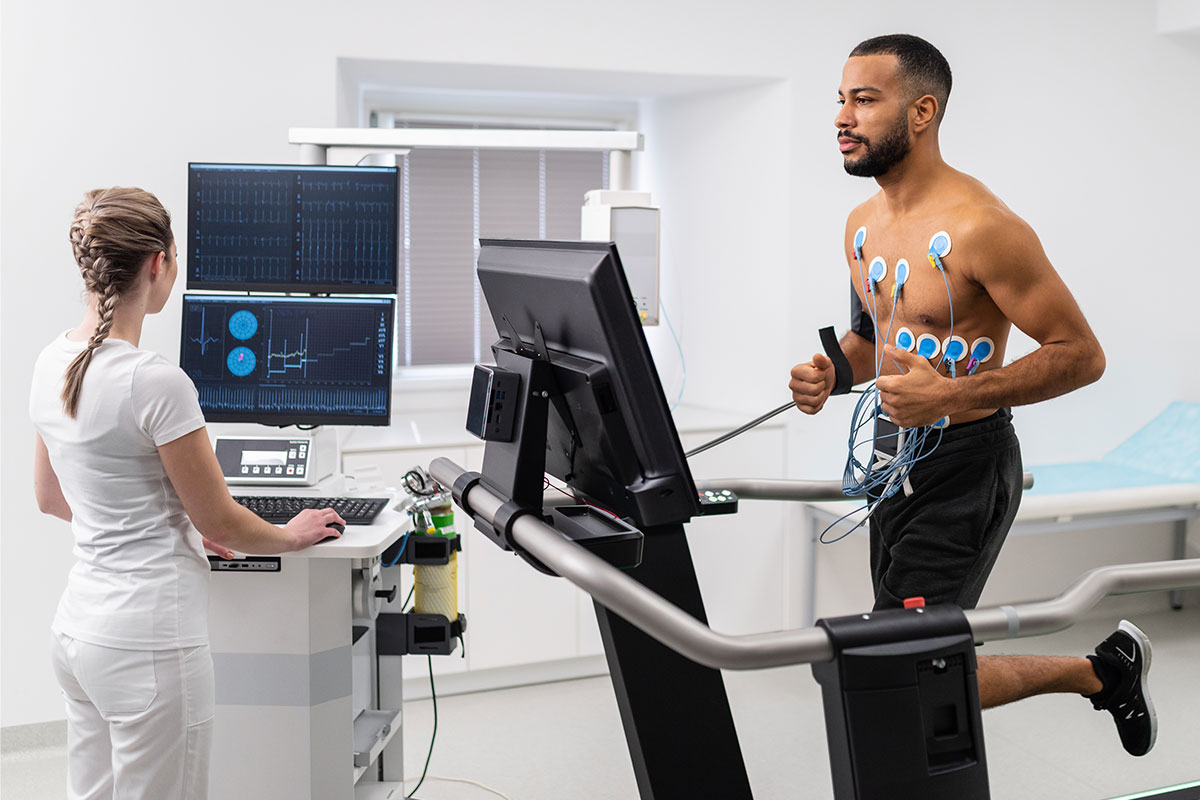A cardiac stress test in Los Angeles is a non-invasive and life-saving diagnostic test for coronary artery disease. Dr. Maddahi may recommend stress testing at his Los Angeles practice when determining if you have blocked arteries. The most common nuclear stress test techniques for cardiac imaging are single photon emission computed tomography (SPECT) and positron emission tomography (PET).
How Does It Work
Exercise nuclear perfusion imaging takes pictures of your heart while exercising. The test is also called cardiac nuclear stress testing or myocardial perfusion scanning. The primary aim of exercise nuclear perfusion imaging is to check how well blood is flowing to your heart muscle during exercise. You’ll have to exercise on a treadmill or a stationary bike during the test.

The Importance of Exercise Nuclear Perfusion Imaging
A radioactive tracer is injected into a vein that can be tracked to see where blood flow may be lessened or impaired by plaque. This tracer is injected immediately after exercise, and your body is scanned. An additional scan is done with the heart at rest. Because coronary artery disease (plaque in arteries) has no initial symptoms, checking your arteries with a cardiac stress test in Los Angeles is important.
The tracer will distribute evenly in the heart where there are no obstructions. If there are obstructions, the tracer will show a lack of blood flow to the blocked area of the heart. Dr. Maddahi will compare the differences between your two scans. If there is a minimal blockage, the two scans, with exercise and at rest, will look similar.
These stress testing scans have proven to be an excellent detector of coronary artery disease and are available at our Los Angeles office.
What to Expect
Before your stress test, the friendly staff at our Los Angeles office will provide instructions tailored just for you. We ask that you tell us about any medications (prescription or over-the-counter) you are taking. You should also inform us if you are taking antacids, vitamins, or supplements. We will also need to be advised of any medical devices or implants you may be using. Dr. Maddahi will advise on continuing medications and precautions for devices.
For your cardiac stress test in Los Angeles, electrodes will be placed on your chest, and a blood pressure cuff will be attached to your arm. An IV line will be placed in your arm so that we can inject the tracer. You will be asked to walk on a treadmill while the incline of the machine is gradually increased. We will be recording your body’s responses to the stress of exercise.
During the exercise, let us know if you experience chest pain, shortness of breath, nausea, or unusual sensations. Once you feel you have reached maximum endurance on the treadmill, let us know. The tracer will be injected into the IV line. You may be asked to walk for a few more minutes, so the tracer has time to circulate through your body.
You will then lie flat on a table, and your body will be scanned. During this time, it is essential that you remain still, as moving around will blur your images. We will scan your body while at rest. For this portion of the cardiac stress test in Los Angeles, you will again be injected with the tracer, and your body will be scanned. This test may be performed in one visit or ordered over two separate appointments.
During stress testing, the activity of your heart is recorded and analyzed by Los Angeles heart specialist Dr. Maddahi. If any abnormalities are found, Dr. Maddahi will prepare a plan to get you on the right track for a healthy heart. Call us with any questions or concerns about your nuclear stress test. Dr. Maddahi and our staff will work to make sure you understand everything you need to know to have a successful result.
Why Is It Done
Exercise nuclear perfusion imaging is done to determine if you may have arterial blockages because of coronary artery disease, a serious medical condition caused by the buildup of plaque in the coronary arteries. Plaque is made up of cholesterol, fat, calcium, and other substances found in the blood. When plaque builds up, it narrows the coronary arteries, which limits the flow of oxygen-rich blood to the heart, leading to chest pain (angina), shortness of breath, and heart attacks.
Coronary artery disease doesn’t produce symptoms at the initial stages, but it can eventually lead to numerous life-threatening complications. As such, your cardiologist may recommend a cardiac stress test in Los Angeles if you have a high risk of CAD. This is a non-invasive and life-saving diagnostic test.

Early Detection Is Essential
Dr. Maddahi has a proven record of changing the direction of heart health. Even patients with a family history of heart disease have benefited from Dr. Maddahi’s guidance to ensure you have an exceptional quality of life well into old age. If you have a family history of heart disease, Dr. Maddahi would like to see you in your mid 30’s. Early detection is your best bet for a successful program of prevention. With all of today’s technology behind him, Dr. Maddahi will help you to reach your health goals.
